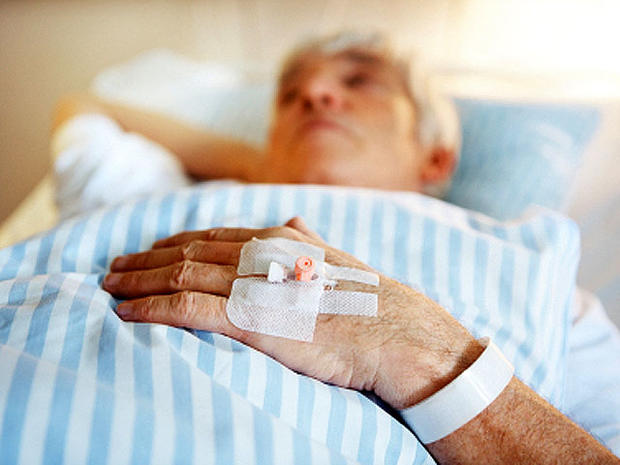Study: Seniors may develop memory problems after hospital stay
(CBS News) At one point or another, there's a good chance an older adult over 65 might wind up in the hospital. A new study suggests those adults could wind up with a new set of memory problems following their visit.
PICTURES: Alzheimer's disease: 7 things that raise your risk
The study tracked nearly 1,900 seniors for 12 years and found those who were hospitalized experienced double the decline in memory and cognitive skills, compared with adults the same age who weren't hospitalized.
"Our study is timely as the United States population continues to rapidly age and researchers try to identify factors that could reduce memory and thinking problems in the elderly," study author Dr. Robert S. Wilson, a , senior neuropsychologist of the Rush Alzheimer's Disease Center in Chicago, said in a written statement. "Understanding a possible link to something as common as hospital stays is extremely important."
It's no secret adults start to lose their memory as they get older, and a slight cognitive decline is normal and expected, the researchers said. The 12-year study looked at 1,870 adults over 65 who lived in Chicago. Every three years, the researchers gave them thinking and memory tests and assigned them a score based on how they did. During the study, 71 percent of the older adults were hospitalized at least once.
As expected, scored declined as the seniors aged. But the decline occurred twice as fast after a first hospital stay, compared either to their previous rate before being admitted or with people who were not admitted to the hospital. On a test for long-term memory, the decline was three times faster after the first hospital stay, and on a complex attention test, the decline was 1.5 times faster following hospitalization.
Even after accounting for other factors such as severity of the illness that required hospitalization, length of hospital stay, or age of patients who were much older, the researchers still saw the cognitive decline. In fact, only 3 percent of participants were hospitalized in the critical care unit, meaning most had general medical problems. The study was published in the March 21 issue of Neurology.
What explains the link?
"Hospitalization is very common in older age and many older Americans are struggling with their [mental] function," Wilson told WebMD. "We think that people who have [mental] problems may be more likely to be hospitalized in the first place."
Barbara Resnick, president of the American Geriatrics Society, told USA Today that elderly patients stay in bed too much when they're hospitalized and aren't motivated enough to move around or have contact with others. She says hospitals need to change how they treat the elderly.
Are we surprised at these findings? No," Resnick said. "The focus of acute care is taking care of the medical problem and not the care of the elderly down the road. Cognitive function is the last thing to be considered."
But experts are warning the study shouldn't scare people off from seeking necessary medical treatment.
"The hospital can be a bad place to go if you're an older individual," Dr. Marie Bernard, deputy director of the National Institute on Aging, told USA Today. "It should be avoided if possible, but that doesn't mean patients shouldn't see their health care provider. They need to do that."
There are other ways to stave off memory loss for aging adults, including eating healthy, not smoking and doing challenging puzzles, HealthPopreported.

